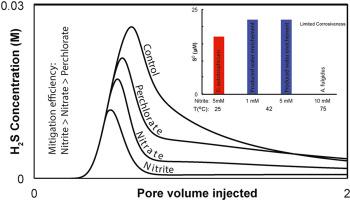当前位置:
X-MOL 学术
›
Int. Biodeterior. Biodegrad.
›
论文详情
Our official English website, www.x-mol.net, welcomes your
feedback! (Note: you will need to create a separate account there.)
Nitrite is a more efficient inhibitor of microbial sulfate reduction in oil reservoirs compared to nitrate and perchlorate: A laboratory and field-scale simulation study
International Biodeterioration & Biodegradation ( IF 4.1 ) Pub Date : 2021-02-01 , DOI: 10.1016/j.ibiod.2020.105154 Moein J. Veshareh , Kasper U. Kjeldsen , Alyssa J. Findlay , Hamidreza M. Nick , Hans Røy , Angeliki Marietou
International Biodeterioration & Biodegradation ( IF 4.1 ) Pub Date : 2021-02-01 , DOI: 10.1016/j.ibiod.2020.105154 Moein J. Veshareh , Kasper U. Kjeldsen , Alyssa J. Findlay , Hamidreza M. Nick , Hans Røy , Angeliki Marietou

|
Abstract Microbial sulfate reduction is the most significant source of hydrogen sulfide (souring) as oil reservoirs are flooded with seawater (with mM concentrations of sulfate) for secondary oil recovery. Nitrate (nitrite) injections into the reservoirs are routinely used to constrain souring. Perchlorate was proposed as an alternative souring mitigation agent, however its effectiveness remains to be determined on a field scale. We used a combination of laboratory-based experiments and field scale numerical models to compare the efficacy of nitrate, nitrite, and perchlorate in inhibiting sulfide production in offshore oil reservoirs. Our results suggest that on a field scale perchlorate inhibits sulfide accumulation by inhibiting sulfate reduction and promoting sulfide oxidation. Elemental sulfur production was observed during nitrate reduction by Archaeglobus fulgidus confirming previous suggestions that the process is coupled to the oxidation of sulfide. Finally, nitrite was the most efficient inhibitor of sulfide accumulation, further confirmed by our field scale simulations. Our field scale simulations predict that injection of 1 mM of nitrite can reduce souring by 92%, while perchlorate (1 mM) or nitrate (1 mM) have the potential to reduce sulfide accumulation by 57% and 80% respectively.
中文翻译:

与硝酸盐和高氯酸盐相比,亚硝酸盐是油藏中微生物硫酸盐还原的更有效抑制剂:实验室和现场规模模拟研究
摘要 微生物硫酸盐还原是硫化氢(酸化)的最重要来源,因为油藏被海水(具有 mM 浓度的硫酸盐)淹没以进行二次采油。硝酸盐(亚硝酸盐)注入储层通常用于抑制酸化。高氯酸盐被提议作为替代的酸味缓解剂,但其有效性仍有待在现场规模上确定。我们结合基于实验室的实验和现场规模的数值模型来比较硝酸盐、亚硝酸盐和高氯酸盐在抑制海上油藏硫化物生产方面的功效。我们的结果表明,在田间规模上,高氯酸盐通过抑制硫酸盐还原和促进硫化物氧化来抑制硫化物积累。Archaeglobus fulgidus 在硝酸盐还原过程中观察到元素硫的产生,这证实了先前的建议,即该过程与硫化物的氧化有关。最后,亚硝酸盐是硫化物积累的最有效抑制剂,我们的现场规模模拟进一步证实了这一点。我们的现场规模模拟预测,注入 1 mM 亚硝酸盐可以减少 92% 的酸味,而高氯酸盐 (1 mM) 或硝酸盐 (1 mM) 有可能分别减少 57% 和 80% 的硫化物积累。
更新日期:2021-02-01
中文翻译:

与硝酸盐和高氯酸盐相比,亚硝酸盐是油藏中微生物硫酸盐还原的更有效抑制剂:实验室和现场规模模拟研究
摘要 微生物硫酸盐还原是硫化氢(酸化)的最重要来源,因为油藏被海水(具有 mM 浓度的硫酸盐)淹没以进行二次采油。硝酸盐(亚硝酸盐)注入储层通常用于抑制酸化。高氯酸盐被提议作为替代的酸味缓解剂,但其有效性仍有待在现场规模上确定。我们结合基于实验室的实验和现场规模的数值模型来比较硝酸盐、亚硝酸盐和高氯酸盐在抑制海上油藏硫化物生产方面的功效。我们的结果表明,在田间规模上,高氯酸盐通过抑制硫酸盐还原和促进硫化物氧化来抑制硫化物积累。Archaeglobus fulgidus 在硝酸盐还原过程中观察到元素硫的产生,这证实了先前的建议,即该过程与硫化物的氧化有关。最后,亚硝酸盐是硫化物积累的最有效抑制剂,我们的现场规模模拟进一步证实了这一点。我们的现场规模模拟预测,注入 1 mM 亚硝酸盐可以减少 92% 的酸味,而高氯酸盐 (1 mM) 或硝酸盐 (1 mM) 有可能分别减少 57% 和 80% 的硫化物积累。











































 京公网安备 11010802027423号
京公网安备 11010802027423号